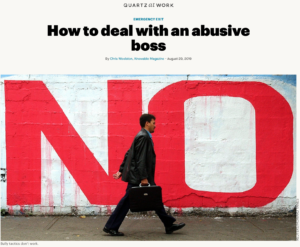What do we mean when we speak about a toxic boss? A toxic boss is a person who believes that the way to get team members to perform is through shouting, belittling, and bullying the people that they should be leading. According to an article published by the business news organization, Quartz, about 10% of bosses fit the mold of abusive or toxic bosses. The article, written by Chris Woolston and originally published in Knowable Magazine, cites a wide variety of research and experts.

Often, the experts say, abusive bosses believe that this mode is the most effective way to manage people. Often this is the result of the Peter Principle, in which a functional or technical expert is promoted into a supervisory position without receiving appropriate training and development of leadership skills. Some research shows that the behavior of certain employees makes it more likely that their supervisor would resort to abusive practices.
It is often said that people join companies but leave poor bosses. The article speaks of more effective leadership practices rather than the abusive practices of a toxic boss.
The article provides some advice for those faced with a toxic boss, as follows:
- Consider jumping ship. Since only 10% of bosses are toxic, chances are the next one would not be.
- Team up. Employees often work together to warn and protect each other of a toxic boss.
- Keep your distance. Few people enjoy being abused, so one alternative is to limit the interactions with the toxic boss as much as possible.
- Take the long view. Some people tolerate a toxic boss with the view that all things must pass.
- Don’t fan the flames. Keeping a low profile can make a person less of a target for the abusive behavior.
- Play the game. One tried and true strategy is the practice of “kissing up,” working to appease the toxic boss.
A toxic boss demotivates team members, causing lost productivity and reduced performance. See the full article for a more detailed discussion of the perils of toxic bosses.

Add your comment